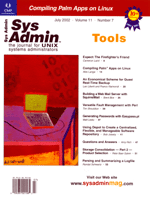
Article
Listing 1
Listing 1 Copy this file, make it executable, and put it where your users can find it (usually /usr/local/bin).
#!/usr/bin/perl -w
# Easypass.pl
# Version: 1.0
# Author: Matt Lesko, matt@advancedatatools.com http://mattlesko.dyndns.org:8080
# Inspired by: Mark A. Pors's Sort-of-pronouncable (SoP) password generator
# mark@dreamzpace.com, www.dreamzpace.com
# License: GPL
# http://www.gnu.org/copyleft/gpl.html
use strict;
use Getopt::Long;
my $dictionary = '/usr/dict/words'; # path to dict file (site dependent)
# This are the option variables, they will be undefined or 0 is no option is set
my $help = ''; # Will be true if -h or --help is specified
my $oneword = ''; # Will be true if -1 or --oneword is specified
my $number = ''; # Will be true if -n or --number is specified
my $usespecial = ''; # Will be true if -s or --special is specified
my $usel33t = ''; # Will be true if -l or --l33t is specified
my $wordlength = 0; # Will be true if -w=x or --word=x is specified (default: 5)
my $digitlength = 0; # Will be true if -d=x or --digit=x is specified (default: 2)
my $speciallength = 0; # Will be true if -g=x or --slength=x is specified (default: 1)
my $numwords = 0; # Will be true if -p=x or --passwords=x is specified (default: 10)
GetOptions ('h|help|?' => \$help, '1|oneword' => \$oneword, 'n|number' =>
\$number, 's|special' => \$usespecial, 'l|l33t' => \$usel33t, 'w|word=i' =>
\$wordlength, 'd|digit=i' => \$digitlength, 'g|slength=i' => \$speciallength,
'p|passwords=i' => \$numwords);
if($help)
{
print "\n\n";
print "Usage: $0 [options] \n\n";
print "Prints out a list of semi-memorable password for your choosing.\n";
print "The following options are supported:\n\n";
print " -h, --help Print this message\n";
print " -1, --oneword Prints only one random word (default: two)\n";
print " -n, --number Prints a random number (default: does not)\n";
print " -s, --special Prints out a 'special' character (&, #, etc.)\n";
print " -l, --l33t Forces the passwords to have 'l33t-sp34k'\n";
print " -w=x, --word=x Forces the words to be x characters (def:5,
min:3, max:8)\n";
print " -d=x, --digit=x Forces the number of digits to be x(def:2,
max:8)\n";
print " -g=x, --slength=x Forces the number of special characters to x
(def:1, max:8)\n";
print " -p=x, --passwords=x Forces the number of passwords printed to be x
(def:10)\n\n";
print "Please send any questions/comments/bugs to matt\@advancedatatools.com\n";
exit;
}
my @special = ('~', '!', '@', '#', '$', '%', '^', '&', '*', '(', ')', '_', '-', '+', '=');
my @dict;
open (DICT, "<$dictionary") || die ("Cannot open dict: $!, dictionary is located
at $dictionary, according to this program;
try changing this to your system.");
while (<DICT>) {
chomp;
push (@dict, $_);
}
# If the user gave us a number, use that; else, default to 10
if($numwords == 0) {
$numwords = 10;
} elsif ($numwords < 0) {
$numwords = 1;
}
# If the user gave us a wordlength, use that; else, default to 5, also, make
# sure that the number is between 3 and 8
if($wordlength == 0) {
$wordlength = 5;
} elsif ($wordlength > 8) {
$wordlength = 8;
} elsif ($wordlength < 3) {
$wordlength = 3;
}
# Parts is a variable that lets us build the password to the desired length
my $parts = 0;
if($wordlength > 4) {
$parts = int(8/$wordlength);
} else {
$parts = int(3/$wordlength);
}
# This begins the main program loop, does this until we've done as many
for (my $j=0;$j<$numwords;$j++) {
my @sub = ();
my $word = '';
# We get the first word here, and truncate it to 6; may change this (delete $sublen)
for (my $i=0;$i < $parts; $i++) {
do {
$sub[$i] = substr ($dict[int (rand @dict)], 0);
}
until (length $sub[$i] == $wordlength);
$word .= lc $sub[$i];
}
# Here we take two numbers, if the user wants it, and insert it after the word
if($number) {
if($digitlength == 0) {
$digitlength = 2;
} elsif ($digitlength < 1) {
$digitlength = 1;
} elsif ($digitlength > 8) {
$digitlength = 8;
}
$word .= substr (int rand (10**(10)), 0, $digitlength);
}
# Here we put the special character(s) in, if the user wanted us too
if($usespecial) {
if($speciallength == 0) {
$speciallength = 1;
} elsif ($speciallength < 1) {
$speciallength = 1;
} elsif ($speciallength > 8) {
$speciallength = 8;
}
for(my $l=0; $l<$speciallength; $l++) {
$word .= substr ($special[int (rand @special)], 0);
}
}
# Here we get the last word, unless they told us not too; plus it may not matter
# for some systems (most UNIX boxes only take 8 characters)
unless($oneword){
for (my $i=0;$i < $parts; $i++) {
do {
$sub[$i] = substr ($dict[int (rand @dict)], 0);
}
until (length $sub[$i] == $wordlength);
$word .= lc $sub[$i];
}
}
# Here we convert to l33t-sp34k; e->3, o->0, i->1, a->4, t->7, s->$ (any others?)
if($usel33t) {
$word =~ s/e+/3/;
$word =~ s/o+/0/;
$word =~ s/i+/1/;
$word =~ s/a+/4/;
$word =~ s/t+/7/;
$word =~ s/s+/\$/;
}
print "$word\n";
}
|